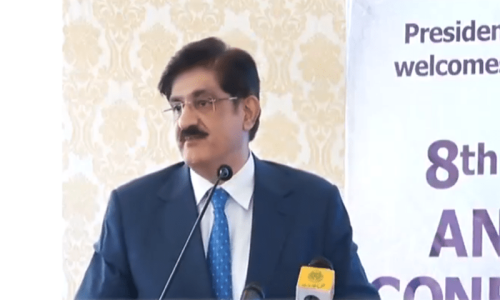KARACHI, Dec 28: The ‘neighbourhood-care’ policing project being practised in certain affluent residential areas of the city for the last few years is being done at the expense of less affluent areas, where such a system is not in practice, it has emerged.
Though the material resources are provided by the area residents, the primary requirement of human resources — policemen — is provided by the area police.
The neighbourhood-care projects are functioning in the Defence Housing Authority, Ferozabad Block 6, Al Hamra Society and C.P. Berar Society. Some projects similar to the neighbourhood-care programme are also being run by different associations, providing police with material resources in exchange for dedicated police presence.
“Suppose, if 30 policemen are put by the area police at the disposal of the neighbourhood care, those 30 men are being taken out from the number of the personnel required for the whole town. Thus it is at the expense of the taxpayer who does not live within the area covered by the neighbourhood-care project,” said a senior police officer requesting not to be named.
“Why should an ordinary citizen who cannot pay for his security exclusively be deprived of his right of protection guaranteed in the constitution of the country?” he remarked.
“This model of policing is in vogue only in Karachi, which severely dents the authority, command and discipline of the force,” observed a police official.
System in practice
Under the mechanism, the area association gives a police mobile, generally a Suzuki pick-up truck or motorcycles, to the area police. In addition, the association gives a stipend of Rs1,500 to each policeman assigned duty in their area.
In return, the association demands from the police authorities that the police mobile and personnel are not sent on duty to other areas.
Similarly, they demand a specific number of policemen posted in their areas. Thus those policemen remain posted in the specified residential area.
According to the understanding between the area association and the police, only for VVIP duties, such as during the presence of the president or the prime minister in the city, the association allows police mobiles donated by it to do the ‘Intezam duty’.
Citing the instance of a residential society in Gulshan Town, a senior police officer said that against their request for sparing a certain number of policemen for their area, police authorities said that they should hire three private security guards for each policeman they needed.
However, subsequently they didn’t hire the guards saying that it would upset the budget of the society as members didn’t contribute money regularly.
Perhaps one is justified in asking whether the residents of a less affluent area would get the same quality police services.
‘Elitist model of policing’
“The law ensures uniform security for all and not safety of a few at the expense of many,” said Gulshan-i-Iqbal SP Sohail Zafar Chattha. The police lose the respect of society with this model of policing, where police secure the life and property of only those few who can afford to pay. This is an elitist model of policing,” SP Chattha added.
In Ferozabad, under the project 10 vehicles have been provided by the community with private drivers, each carrying three policemen.
“The concept of community policing is very narrow and needs improvement. In Karachi it is limited to providing material resources by the community. What is required from a society is that they share information about criminal elements with police and point out anti-social elements in their area,” Jamshed Town SP Javed Akbar Riaz said.
For the DHA neighbourhood-care project, there are around 22 policemen. However, there has been a constant demand that policemen should remain at the houses of CPLC members in the area, a police officer said. A senior police officer said that between 22 to 30 policemen constituted the total strength of some police stations in the city. On the other hand, such a number was being spared for a specific area, which was unjust.
Defending the project, Citizens-Police Liaison Commit-tee chief Sharfuddin Memon said that general policing was not affected by their projects as the manpower was taken from the reserve police and the police station concerned had no role in the neighbourhood-care projects being run in different parts of the city.
He said that under the neighbourhood-care project, vehicles or motorcycles provided by the community control rooms were connected with a wireless system. A dedicated team of policemen worked under the management of the project.
In the DHA, under the neighbourhood-care project, a network of cameras is being installed and the vehicles being used for policing were fitted with trackers in order to find out their location, Mr Memon said.
“It’s a rare example of public-private partnership being practised in the city. This model of policing could be replicated at the grass-roots level.”













































Dear visitor, the comments section is undergoing an overhaul and will return soon.